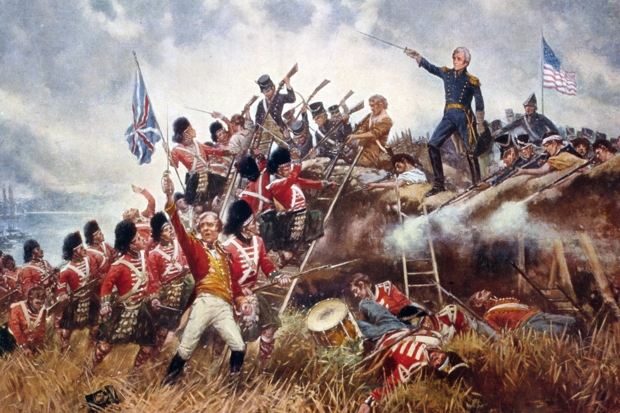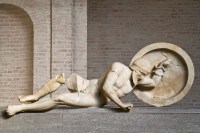2015 is the year of Waterloo and Wellington. The 200th anniversary will be celebrated with grand commemorations on the battlefield and in London.
But today, January 8th, 2015, is also the 200th anniversary of the Battle of New Orleans – the last time Britain fought America, and the beginning of the special relationship. How smoothly and quickly we moved from bloody slaughter to two centuries of close friendship.
And how remarkable that the battle is forgotten here. Perhaps that’s because we lost so spectacularly to General Andrew ‘Old Hickory’ Jackson, the future American President. The battle concluded the War of 1812 between Britain and America, which ended in a score draw a month after the battle.
I only remember the battle because the leader of the losing British forces was my great-great-great-great uncle, Major-General Sir Edward Pakenham – Wellington’s brother-in-law, known as Ned. The marriage of Ned’s sister, Kitty, to Wellington won’t be getting much attention in the Waterloo commemorations. It was a miserable union, scarred by Wellington’s flirtations and Kitty’s shy, nervous disposition.
The Americans remember the battle better, not least in their traditional song, The Battle of New Orleans, which Lonnie Donegan took to number two in the British charts in 1959:
Well, in 1814, we took a little trip, Along with Colonel Pakenham, down the mighty Mississipp’. We took a little bacon and we took a little beans, and we fought the bloomin’ British in the town of New Orleans.
These days, the battlefield at Chalmette – an old plantation flanked by swamp and cypress trees – is rarely visited, even though it’s only six miles east of Bourbon Street, the jumping heart of New Orleans. The site is on the banks of the Mississippi; the paddle-steamers turn around at Chalmette, without dropping any tourists at the battlefield, now a vast rectangle of well-mown lawn.
When I visited, I was the only one on that lawn: it was a fortnight after Hurricane Katrina hit New Orleans in 2005, and I was reporting on the disaster for the Telegraph.
Floodwaters had engulfed a neighbouring refinery; the spot where Uncle Ned died was soaked with toxins and oil. A thick, petrol smell hovered in the hot, humid air.
American soldiers had returned to Chalmette for the first time since Old Hickory’s victory. They zoomed along the edge of the battlefield in Humvees, ferrying troops from a helicopter carrier moored on the Mississippi. A park police helicopter perched on the grass next to Beauregard House, a porticoed, classical mansion built on the battlefield in 1830.
Hurricane Katrina had littered the grand drive to the battlefield cemetery with oak branches. A speedboat, whisked 100 yards from the Mississipi by the hurricane, rested in the battlefield entrance. The poisoned water had turned the grass of the battlefield brown and drenched the curator’s archives in Beauregard House.
The battle was doomed from the outset – not thanks to Uncle Ned, even if he wasn’t the brightest of sparks. Born into a grand family – his father was Lord Longford, of Pakenham Hall, County Westmeath, Ireland – he’d left school at 15 to join the army. His brother-in-law, the Duke of Wellington, who served alongside Ned in the Battle of Salamanca in July 1812, said, ‘Pakenham may not be the greatest genius, but my partiality for him does not lead me astray when I tell you he is one of the best we have’.
Wellington had made clear he wanted no part in the American campaign. By the time Ned had been hastily handed the New Orleans command, British tactics were in chaos.
Any element of surprise had disappeared: the naval commanding officer, Admiral Cochrane, had already kicked off the campaign, and the Mississippi was bristling with American ships.
Old Hickory was well dug into New Orleans, while the British were marooned on a narrow isthmus of marsh and cypress swamp – as I trudged the ground, the toxic, marshy sludge easily gave way to my steps. The British would have to fight in long, narrow columns, easy to mow down.
Supply lines back to the British ships were 80 miles long; and it was near impossible to drag heavy guns and ammunition across that soft sludge. The American positions were protected by thick cotton bales, which absorbed the heaviest shot; while the British were barely protected by perilously low, timber sugar casks.
The British attack didn’t stand a chance. Our boats couldn’t cross the Mississippi quickly enough; they had to be hauled over a mud-bar. Our columns were raked by heavy artillery. When they tried to climb the American defences, it turned out that the ladders and fascines – bundles of wood laid over rough, wet, ground – had been left behind by negligent Colonel Mullins, later cashiered at the Royal Barracks in Dublin.
Ned was galloping forward into artillery fire, waving his hat to rally the troops, when his horse was killed and grapeshot smashed his knee. As he mounted another horse, a ball hit him in the spine. His last words, whispered to an aide, were ‘Lost through lack of courage’.
‘Nothing in Ned’s last moments can have been more agonising than knowing he had failed,’ says Eliza Pakenham, Ned’s great-great-great-great niece, and author of Tom, Ned and Kitty – An Intimate Portrait of an Irish Family. ‘The impossible terrain at New Orleans, the lack of heavy guns and desperate shortage of artillery ammunition doomed the attack from the start.’
The British sustained 2,042 casualties; the Americans 71. To make things worse, the battle was unnecessary. The Treaty of Ghent, ending the 1812 War, was signed on Christmas Eve. News of the treaty didn’t reach Washington until February 17.
Too late for 36-year-old Uncle Ned, whose body was on its way back to the family vault in Killucan, Westmeath, in a cask of rum.
His heart was buried beneath a pecan tree at the Villeré plantation in New Orleans. For many years, the slaves refused to eat the pecans, for fear they were coated in his blood.
Harry Mount is the author of How England Made the English (Viking)






Comments